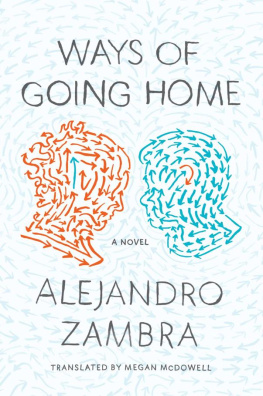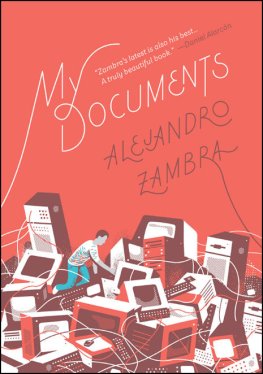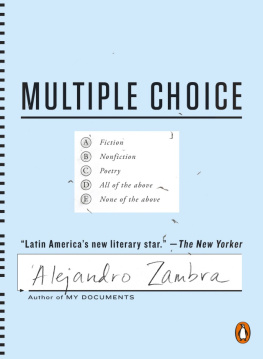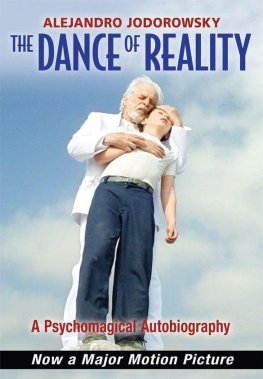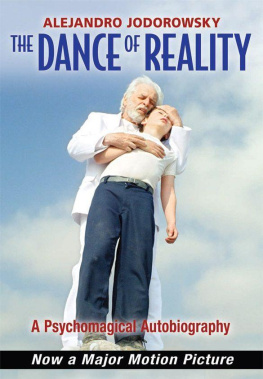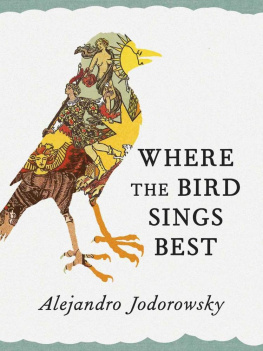
The author and publisher have provided this e-book to you for your personal use only. You may not make this e-book publicly available in any way. Copyright infringement is against the law. If you believe the copy of this e-book you are reading infringes on the authors copyright, please notify the publisher at: us.macmillanusa.com/piracy .
For Andrea
Contents
Now I know how to walk; I can no longer learn to walk. W. Benjamin Instead of howling, I write books. R. Gary
SECONDARY CHARACTERS
Once, I got lost. I was six or seven. I got distracted, and all of a sudden I couldnt see my parents anymore. I was scared, but I immediately found the way home and got there before they did. They kept looking for me, desperate, but I thought that they were lost. That I knew how to get home and they didnt.
You went a different way, my mother said later, angry, her eyes still swollen.
You were the ones who went a different way, I thought, but I didnt say it.
Dad watched quietly from the armchair. Sometimes I think he spent all his time just sitting there, thinking. But maybe he didnt really think about anything. Maybe he just closed his eyes and received the present with calm or resignation. That night he spoke, though: This is a good thing, he told me. You overcame adversity. Mom looked at him suspiciously, but he went on stringing together a confused speech about adversity.
I lay back on the chair across from him and pretended to fall asleep. I heard them argue, always the same pattern. Mom would say five sentences and Dad would answer with a single word. Sometimes he would answer sharply: No. Sometimes he would say, practically shouting: Liar. Sometimes he would even say, like the police: Negative.
That night Mom carried me to bed and told me, perhaps knowing I was only pretending to sleep and was listening, curious and attentive: Your father is right. Now we know you wont get lost. That you know how to walk in the street alone. But you should concentrate more on the way. You should walk faster.
I listened to her. From then on, I walked faster. In fact, a couple of years later, the first time I talked to Claudia, she asked me why I walked so fast. She had been following me for days, spying on me. We had met not long before, on March 3, 1985the night of the earthquakebut we hadnt talked then.
She was twelve and I was nine, so our friendship was impossible. But we were friends, or something like it. We talked a lot. Sometimes I think Im writing this book just to remember those conversations.
The night of the earthquake I was scared but I also, in a way, enjoyed what was happening.
In the front yard of one of the houses, the adults put up two tents for the children to sleep in, and at first it was chaos because we all wanted to sleep in the one that looked like an igloothose were still a novelty back thenbut they gave that one to the girls. So we boys shut ourselves in to fight in silence, which was what we did when we were alone: hit each other furiously, happily. But then the redheads nose started bleeding, so we had to find another game.
Someone thought of making wills, and at first it seemed like a good idea; after a while, though, we decided it didnt make sense, because if a bigger earthquake came and ended the world, there wouldnt be anyone to leave our things to. Then we imagined that the earth was like a dog shaking itself so people fell off like fleas into space, and we thought about that image so much it made us laugh, and it also made us sleepy.
But I didnt want to sleep. I was tired like never before, but it was a new tiredness that burned my eyes. I decided to stay up all night and I tried to sneak into the igloo to keep talking to the girls, but the policemans daughter threw me out, saying I wanted to rape them. Back then I didnt know what a rapist was but I still promised I didnt want to rape them, I just wanted to look at them, and she laughed mockingly and replied that that was what rapists always said. I had to stay outside, listening to them pretend that their dolls were the only survivors; they mourned their owners, crying spectacularly when they realized they were dead, although one of them thought it was for the best, since the human race had always seemed repellent to her. Finally, they argued over who would be in charge. The discussion seemed long to me, but it was easily resolved, since there was only one original Barbie among the dolls: she won.
I found a beach chair among the rubble and shyly approached the adults bonfire. It was strange to see the neighbors all gathered together, maybe for the first time ever. They drowned their fear in cups of wine and long looks of complicity. Someone brought an old wooden table and threw it casually on the fire. If you want, Ill throw the guitar on, too, said Dad, and everyone laughed, even me, though I was a little disconcerted because Dad didnt usually tell jokes. Thats when our neighbor Ral returned, and Magali and Claudia were with him. These are my sister and my niece, he said. After the earthquake he had gone to look for them, and now he was coming back, visibly relieved.
Ral was the only person in the neighborhood who lived alone. It was hard for me to understand how someone could live alone. I thought that being alone was a kind of punishment or disease.
The morning he arrived with a mattress strapped to the roof of his old Fiat 500, I asked my mother when the rest of his family would come; she answered sweetly that not everyone had family. Then I thought we should help him, but after a while I caught on, surprised, that my parents werent interested in helping Ral; they didnt think it was necessary and they even felt a certain reluctance toward that young, thin man. We were neighbors, we shared a wall and a privet hedge, but there was an enormous distance separating us.
It was said around the neighborhood that Ral was a Christian Democrat, and that struck me as interesting. Its hard to explain now why a nine-year-old boy would be interested that someone was a Christian Democrat. Maybe I thought there was some connection between being a Christian Democrat and the sad circumstance of living alone. I had never seen Dad speak to Ral, so I was surprised to see them sharing a few cigarettes that night. I thought they must be talking about solitude, that Dad was giving our neighbor advice about how to overcome solitude, though Dad must have known very little about the subject.
Magali, meanwhile, was holding Claudia tightly in a corner, away from the group. The two of them seemed uncomfortable. I remember thinking that they must have been uncomfortable because they were different from the rest of the people gathered there. Politely, but perhaps with a trace of malice, one neighbor asked Magali what she did for a living; Magali answered immediately, as if shed been expecting the question, that she was an English teacher.
It was very late and I was sent to bed. I had to reluctantly make space for myself in the tent. I was afraid I might fall asleep, but I distracted myself by listening to those stray voices in the night. I understood that Ral had taken his relatives home, because people started to talk about them. Someone said the girl was strange. She hadnt seemed strange to me. She had seemed beautiful. And the woman, said my mother, didnt have an English teachers face.
She had the face of a housewife, nothing more, added another neighbor, and they drew out the joke for a while.
I thought about an English teachers face, about what an English teachers face should be like. I thought about my mother, my father. I thought: What kinds of faces do my parents have? But our parents never really have faces. We never learn to truly look at them.
Next page
